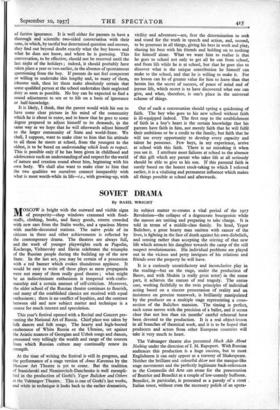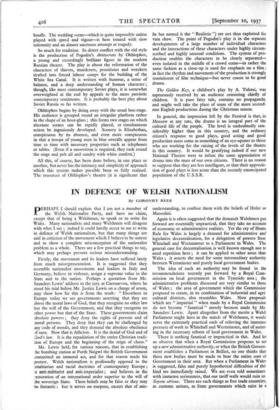SOVIET DRAMA
By BASIL WRIGHT
MOSCOW is bright with the outward and visible signs of prosperity—shop windows crammed with food- stuffs, clothing, books, and fancy goods, streets crowded with new cars from the Stalin works, and a spacious Metro with marble-decorated stations. The naive pride of its citizens in these and other achievements is reflected by the contemporary drama. The theatres are always full, and the work of younger playwrights such as Pogodin, Kocherga, Vishnevsky and Slavin celebrates the triumphs of the Russian people during the building up of the new State. In the last act, you may be certain of a procession with a red banner which evokes thunderous applause. It would be easy to write off these plays as mere propaganda were not many of them really good theatre ; what might be an indiscriminate enthusiasm is tempered with crafts- manship and a certain amount of self-criticism. Moreover, the older school of the Russian theatre continues to flourish, and many of the established classics are received with equal enthusiasm ; there is no conflict of loyalties, and the contrast between old and new subject matter and technique is a source for much interest and speculation.
This year's festival opened with a Recital and Concert pre- senting the National Art of Russia. Chief place was taken by folk dances and folk songs. The hearty and high-booted exuberance of White Russia or the Ukraine, set against the Asiatic nuances of Georgian and Uzbek songs and dances, presented very tellingly the wealth and range of the sources from which Russian culture may continually renew its strength.
At the time of writing the festival is still in progress, and the performance of a stage version of Anna Karenina by the Moscow Art Theatre is yet to come. But the tradition of Stanislavski and Nemirovitch-Danchenko is well exempli- fied in the production of Gorki's Yegor Bulichov and Others at the Vaktangov Theatre. This is one of Gorki's last works, and while in technique it looks back to the earlier dramatists, its subject matter re-creates a vital period of the 1917 Revolution—the collapse of a degenerate bourgeoisie while the masses are uniting and preparing to take charge. It is told in terms of a middle-class family. Its head, Yegor Bulichov, a great hearty man smitten with cancer of the liver, is fighting in the face of death against his own disbeliefs, and sensing rather than accepting the stirring of that new life which attracts his daughter towards the camp of the still suspect revolutionaries. His individual problems are played out in the vicious and petty intrigues of his relations and friends over the property he will leave.
It is a curiously unsatisfactory and inconclusive play in the reading—but on the stage, under the production of Basov, and with Shuichi (a really great actor) in the name part, it achieves the stature of real tragedy. The entire cast, working faithfully to the twin principles of individual acting based on a sincere presentation of reality and an insistence on genuine teamwork, is brilliantly manipulated by the producer on a multiple stage representing a cross- section of the Bulichov mansion. The timing is perfect, each scene moves with the precision of a ballet, and it seems clear that not less than six months' careful rehearsal have been devoted to the production. It is a real object-lesson in all branches of theatrical work, and it is to be hoped that producers and actors from other European countries will take it very much to heart.
The Vaktangov theatre also presented Much Ado About Nothing under the direction of I. M. Rapoport. With Russian audiences this production is a huge success, but to most Englishmen it can only appear as a travesty of Shakespeare. Neither the brilliant and colourful decor nor the masque-like stage movements and the perfectly legitimate back-references to the Commedia del Arte can atone for the presentation of Beatrice and Benedict as a couple of low-comedy buffoons. Benedict, in particular, is presented as a parody of a stout _ Italian tenor, without even the necessary polish of an opera- bouffe. The wedding scene—which is quite impossible unless played with speed and vigour—is here treated with slow solemnity and an almost unctuous attempt at tragedy.
So much for tradition. In direct conflict with the old style is the production of Pogodin's Aristocrats by Okhlopkov, a young and exceedingly brilliant figure in the modern Russian theatre. The play is about the reformation of the characters of thieves, murderers, prostitutes and wreckers drafted into forced labour camps for the building of the White Sea Canal. It is written with humour, a sense of balance, and a deep understanding of human character ; though, like most contemporary Soviet plays, it is somewhat overweighted at the end by appeals to the more patriotic contemporary sentiments. It is probably the best play about Soviet Russia so far written.
Okhlopkov begins by doing away with the usual box-stage. His audience is grouped round an irregular platform rather in the shape of an hour-glass ; this forms two stages on which alternate scenes can be rapidly played, or simultaneous action be ingeniously developed. Scenery is Elizabethan, conspicuous by its absence, and even more conspicuous in that a troupe of young men in blue overalls appear from time to time with necessary properties such as telephones or tables. (Even if a snowstorm is required, they rush round 'the stage and pelt all and sundry with white confetti.) All this, of course, has been done before, in one place or another, but never has the intimacy and simplicity of approach which this system makes possible been so fully realised. The resources of Okhlopkov's theatre (it is significant that he has named it the "Realistic ") are not thus exploited for vain show. The point of Pogodin's play is in the separate developments of a large number of individual characters and the interactions of these characters under highly circum- scribed and highly unusual conditions. The system of pro- duction enables the characters to be clearly separated— even isolated in the middle of a crowd scene—in rather the same fashion as a close-up is used for emphasis on a film ; in fact the rhythm and movement of the production is strongly reminiscent of film technique—but never ceases to be good drama.
The Golden Key, a children's play by A. Tolstoi, was rapturously received by an audience consisting chiefly of children. It is pure fairy tale, contains no propaganda. and might well take the place of some of the more second- rate English productions during the Christmas season.
In general, the impression left by the Festival is that, in Moscow at any rate, the drama is an integral part of the cultural life of the people. The level is undoubtedly con- siderably higher than in this country, and the ordinary citizen's response to good plays, good acting and good production must come as something of an eye-opener to those who are working for the raising of the levels of the theatre in this country. It would be gratifying indeed if our new National Theatre were to infuse the same appreciation of drama into the mass of our own citizens. There is no reason to suppose that they are less intelligent, or that their apprecia- tion of good plays is less acute than the recently emancipated population of the U.S.S.R.











































 Previous page
Previous page